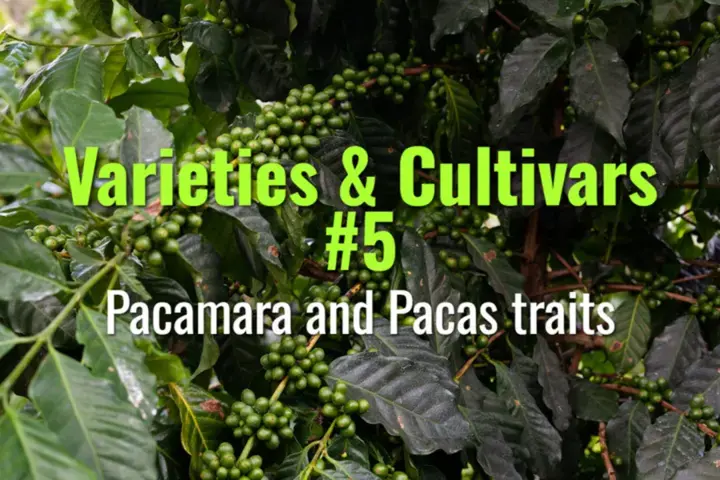Pacamara and Pacas traits
This topic explores the Pacas and Pacamara coffee varieties, their origins in El Salvador, their distinctive traits, and their importance in specialty coffee cultivation.
- Coffee Basics Nerds
- 2 min read
Article 5 of 12 in Varieties & Cultivars/

Pacas
- Origin: Natural mutation of Bourbon discovered in El Salvador in 1949 by the Pacas family.
- Traits:
- Dwarf variety with compact growth, allowing denser planting and easier harvesting.
- Similar cup profile to Bourbon but with slightly higher yields.
- Flavor profile: Balanced, sweet, often with chocolate and nutty notes.
- Weakness: Susceptible to coffee leaf rust and other diseases.
- Importance: Widely cultivated in El Salvador and Honduras; foundation for breeding programs.
Pacamara
- Origin: Hybrid of Pacas × Maragogipe, developed in El Salvador in the 1950s.
- Traits:
- Large, elongated “elephant beans” inherited from Maragogipe.
- Strong plant structure from Pacas, though still requiring good management.
- Medium yield; less consistent productivity compared to Pacas alone.
- Flavor profile: Known for complexity—fruity, floral, winey notes, with heavy body. Highly variable depending on terroir and processing.
- Weakness: Inconsistent cup quality; susceptible to environmental stress.
- Specialty role: Popular in competitions and specialty markets due to its bold and distinctive flavors.
Comparative Overview
- Pacas: Mutation, compact size, higher density planting, stable yields, solid cup quality.
- Pacamara: Intentional hybrid, large beans, highly complex flavor potential, but variable consistency.
Agricultural Importance
- Pacas: Contributed genetic material for breeding, combining Bourbon quality with manageable plant size.
- Pacamara: Represents El Salvador’s role in innovation, showing how hybridization can produce unique cup profiles.
Lasting Importance
- Pacas remains a reliable cultivar with a balance of yield and quality.
- Pacamara has gained international recognition as a competition coffee, highlighting the potential of hybrid breeding.
- Together, they showcase El Salvador’s significant contribution to global coffee diversity and specialty culture.
You might also like:
- Tags:
- Lasting Importance
- Cup Quality
- Flavor Profile
- Specialty Markets
- Leaf Rust
- Global Coffee
- Cup Profiles
- Coffee Leaf
- Cup Profile
- Yield Quality
- Slightly Higher
- Heavy Body
- Flavor Potential
- Higher Yields
- Breeding Programs
- El Salvador
- Complex Flavor
- Fruity Floral
- Large Beans
- Chocolate Nutty
- Balance Yield